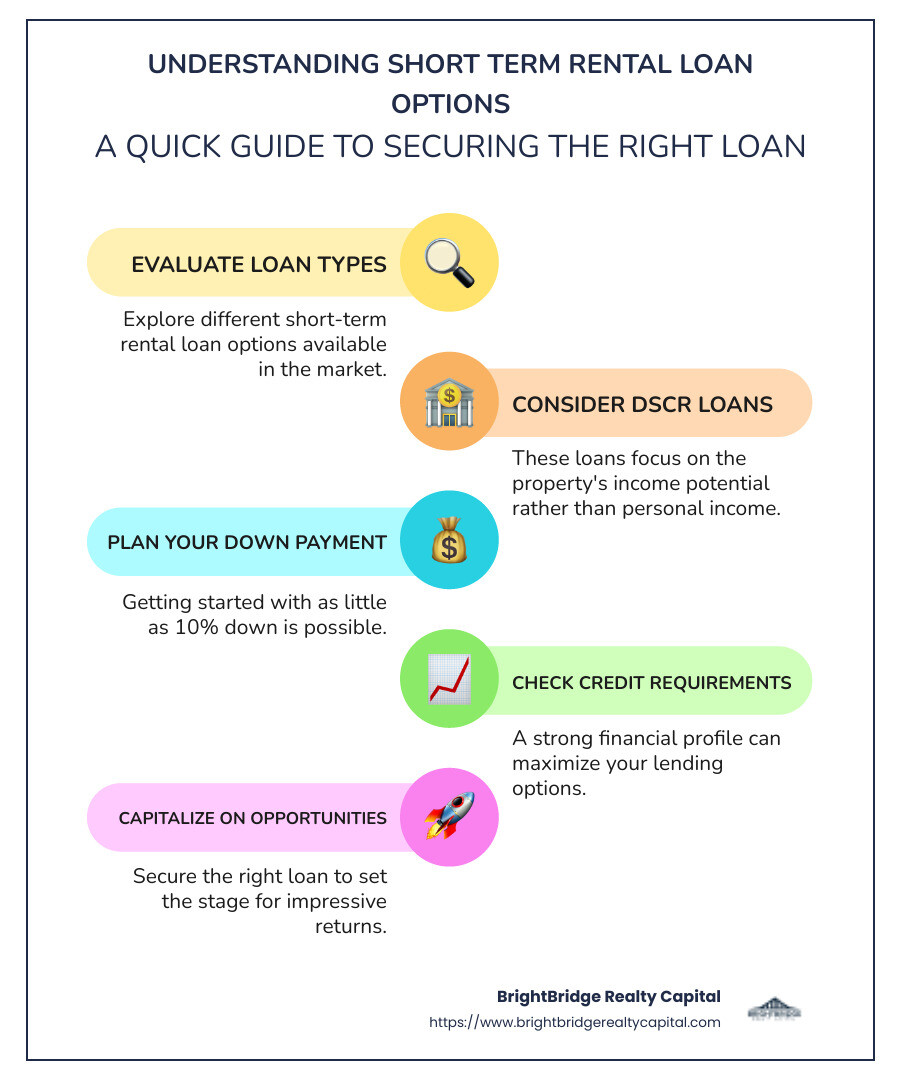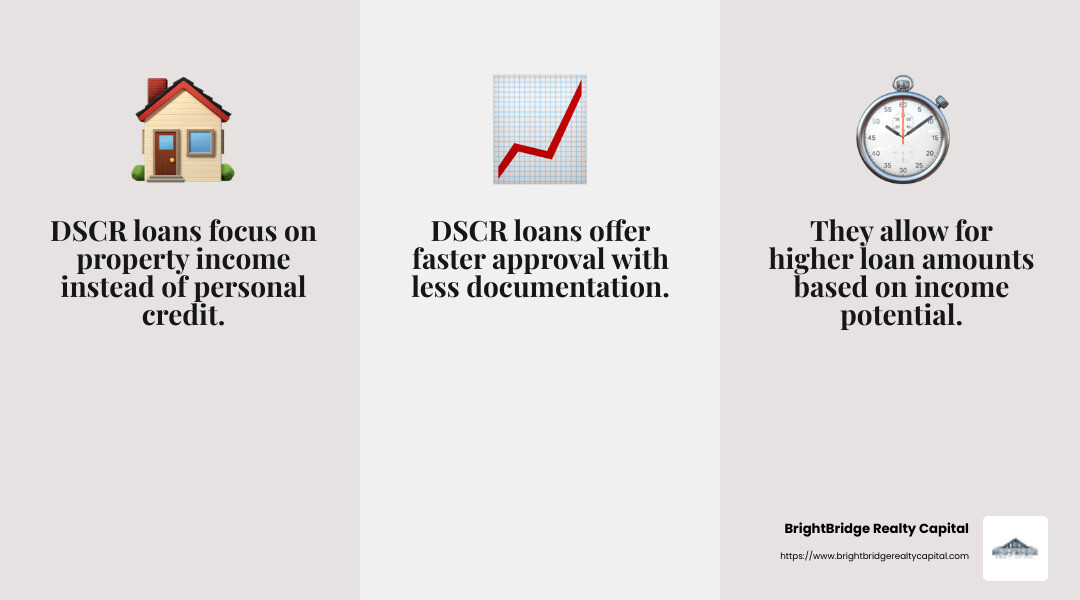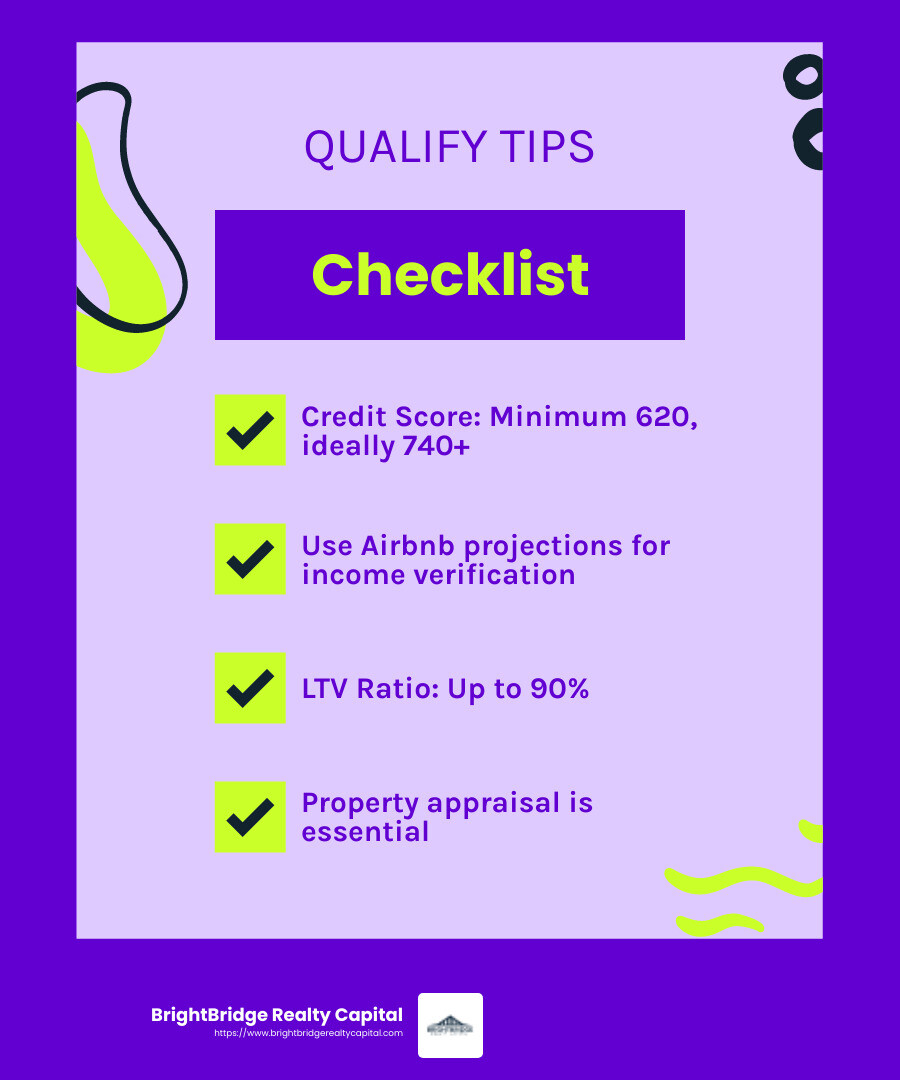Short Term Rental Loans: How to Get Started with Just 10% Down

If you're searching for a loan for short term rental property, you're in the right place. Navigating short-term rental financing can be daunting, but it's also a gateway to lucrative investment opportunities. Here’s a quick rundown to get you started:
- Financing Options: Short-term rental loans focus on the property's income potential, not just the investor's personal income.
- DSCR Loans: Debt service coverage ratio loans often provide the flexibility needed for vacation rentals.
- Down Payment: Getting started with as little as 10% down is possible, making it accessible for many investors.
- Credit Requirements: Though credit score requirements vary, a strong financial profile can maximize lending options.
The allure of changing a property into a successful short-term rental stretches beyond simply owning an investment. It’s about capitalizing on the right financial tools to swiftly grow your real estate portfolio. With the demand for vacation and short-term stays rising, securing the proper loan can set the stage for consistent and impressive returns.

Handy loan for short term rental property terms:
Understanding Short Term Rental Loans
When considering a loan for short term rental property, you’ll encounter several key loan types and financing options custom for this unique investment strategy.
Loan Types
Short-term rental loans are designed with the income-generating potential of the property in mind. Unlike traditional loans, these loans consider projected rental income, making them attractive for properties intended for platforms like Airbnb and VRBO.
Conventional Loans: These are traditional mortgage options that require a solid credit score and significant documentation. They're often more stringent but can offer competitive interest rates.
DSCR Loans: Debt Service Coverage Ratio (DSCR) loans are popular among investors because they focus on the property's ability to cover the loan payments through its income. This means less emphasis on the borrower's personal income, making it easier for those with fluctuating personal finances to secure a loan.
Bridge Loans: For those needing quick financing, bridge loans provide short-term funding to cover immediate needs until long-term financing is secured. They come with higher interest rates but offer flexibility and speed.
Financing Options
Financing options for short-term rentals vary, offering flexibility to fit different investor profiles:
Fixed-Rate Loans: These loans offer stability with a consistent interest rate over the loan term, making budgeting straightforward.
Adjustable-Rate Mortgages (ARMs): These loans start with a lower interest rate that adjusts over time. They can be beneficial if you plan to refinance or sell the property before rates rise.
Interest-Only Loans: With these, you pay only the interest for a set period, reducing initial costs. This can be advantageous if you expect the property’s value to increase significantly.
Why Choose DSCR Loans?
DSCR loans are particularly suited for short-term rentals due to their focus on property income. They allow investors to leverage the projected rental income, rather than just personal credit, to secure financing. This can mean:
- Higher Loan Amounts: Based on income potential, not just personal credit.
- Faster Approval: Less documentation required compared to conventional loans.
- Flexibility: Suitable for properties with seasonal income fluctuations, like beach or ski rentals.

By understanding these loan types and financing options, you can choose the right path for your investment. Whether you’re a seasoned investor or just starting, the right loan can help you capitalize on the growing demand for short-term rentals.
How to Qualify for a Loan for Short Term Rental Property
Securing a loan for short term rental property involves a few key steps. These include evaluating your credit score, verifying income, and conducting a property appraisal. Let's break these down:
Credit Score
Your credit score is crucial when applying for any loan, including short-term rental loans. Generally, a minimum credit score of 620 is required, but a score of 740 or higher can help you secure better rates and terms. A strong credit score reflects your ability to manage debt responsibly, which lenders view favorably.
Income Verification
Unlike traditional loans that heavily rely on personal income, short-term rental loans often focus on the property's income potential. However, some income verification is still required. Lenders may look at:
Projected Rental Income: Platforms like Airbnb and VRBO can provide income projections, which some lenders consider. This is especially true for DSCR loans, where the property's income-generating potential is key.
Existing Rental Income: If you already own rental properties, demonstrating a track record of rental income can strengthen your application.
Some lenders might not even require tax returns or personal income statements, focusing instead on the property's projected cash flow.
Property Appraisal
A property appraisal is a must. This process assesses the property's market value and ensures it's worth the loan amount. An appraisal helps lenders determine the loan-to-value (LTV) ratio, which is crucial for loans with just 10% down.
- LTV Ratio: This is the loan amount compared to the property's appraised value. A lower LTV ratio means less risk for the lender. For short-term rental properties, a typical LTV could be up to 90%, meaning you only need a 10% down payment.
The appraisal also evaluates the property's condition and its potential for generating rental income. A favorable appraisal can significantly improve your loan application.

By focusing on these areas, you'll be better prepared to qualify for a short-term rental loan. Keep these factors in mind as you steer the lending process, and you'll be well on your way to securing the financing you need.
In the next section, we'll explore the benefits of short-term rental loans and how they can boost your investment strategy.
Benefits of Short Term Rental Loans
Short-term rental loans offer a range of benefits that can significantly improve your investment strategy. Let's explore these key advantages: flexibility, income potential, and property appreciation.
Flexibility
Short-term rental loans are designed with flexibility in mind. Unlike traditional loans, these loans often don't require tax returns or personal income statements, focusing instead on the property's income potential. This means you can qualify based on projected rental income from platforms like Airbnb. This flexibility allows you to invest in properties without the usual problems, making it easier to expand your portfolio.
Additionally, some lenders allow you to manage your property through a property management company. This can be a game-changer if you're looking to invest in properties located out of state. You can enjoy the benefits of rental income without having to manage the property personally.
Income Potential
One of the most attractive aspects of short-term rental loans is the potential for high rental income. Short-term rentals often command higher nightly rates compared to long-term leases. This can lead to increased cash flow, especially in popular vacation destinations where demand is high.
For instance, Easy Street Capital uses AirDNA projections to assess the true income potential of a property. By focusing on this potential, you can secure a loan based on the expected rental income rather than personal income, maximizing your investment's profitability.
Property Appreciation
Investing in short-term rentals can also lead to significant property appreciation. As more travelers opt for vacation rentals over hotels, the demand for short-term rental properties continues to rise. This demand can drive up property values, providing you with a valuable asset that appreciates over time.
Moreover, by maintaining and upgrading your property to attract more guests, you can further increase its market value. This dual benefit of income generation and property appreciation makes short-term rental loans an attractive option for savvy investors.
These benefits make short-term rental loans a powerful tool for building wealth and achieving financial freedom. With the right strategy, you can leverage these loans to create a steady stream of income and grow your investment portfolio.
In the next section, we'll discuss the steps to secure a loan with just 10% down, making it even more accessible to start your short-term rental venture.
Steps to Secure a Loan with Just 10% Down
Securing a loan for short term rental property with just a 10% down payment is an achievable goal. Here's how you can make it happen:
1. Understand the Down Payment Requirements
Typically, lenders require a 20-25% down payment for short-term rental properties. However, some lenders offer programs with only a 10% down payment if you meet specific criteria. This means you need to be prepared to demonstrate strong financial health and a promising property investment.
2. Loan-to-Value Ratio (LTV)
The loan-to-value ratio plays a crucial role in determining your down payment. An LTV of 90% means you only need to provide 10% of the property's value upfront. To achieve this, you might need a high credit score and a property with strong income potential.
Higher LTVs are riskier for lenders, which is why they often require excellent credit scores or additional assurances like higher income potential.
3. Steer the Application Process
The application process for a short-term rental loan involves several key steps:
Pre-Qualification: Start by getting pre-qualified. This involves providing basic information about your financial situation and the property you wish to purchase.
Documentation: Gather essential documents such as a government-issued ID, insurance declaration page, and purchase contract. You may also need additional documents like a voided check and HOA contact information, as noted in the research.
Property Appraisal: The lender will conduct an appraisal to determine the property's value. This step is crucial as it affects the LTV ratio.
Credit Evaluation: Lenders will assess your credit score. A minimum score of 680 is often required, but higher scores can improve your chances of securing a loan with favorable terms.
Income Verification: While some loans focus on the property's income potential, having additional income verification can strengthen your application.
4. Leverage Airbnb Income
If you have previous experience with short-term rentals, you can use projected Airbnb income to qualify for the loan. This involves showing a year's worth of income from other properties. This can be a significant advantage if you're looking to secure a loan with a lower down payment.
5. Choose the Right Lender
Not all lenders offer loans with just 10% down for short-term rentals. It's essential to find a lender who understands the unique aspects of short-term rental investments and is willing to work with you to meet your financial goals.
By following these steps, you can successfully secure a loan with just 10% down, allowing you to enter the short-term rental market with less upfront capital. In the next section, we'll tackle some frequently asked questions about short-term rental loans, providing you with even more clarity and confidence as you move forward.
Frequently Asked Questions about Short Term Rental Loans
What is the minimum credit score required?
When seeking a loan for short term rental property, your credit score plays a vital role. Generally, a minimum credit score of 680 is required by most lenders. However, having a higher score can improve your chances of getting better terms and lower interest rates. It's always a good idea to check your credit report and address any issues before applying.
Can I use Airbnb income to qualify?
Yes, you can use Airbnb income to qualify for a loan. Lenders often consider the income potential from platforms like Airbnb when assessing your application. To do this, you'll need to provide a record of at least one year's worth of short-term rental income from other properties you own. This helps demonstrate your ability to generate consistent income, reducing the lender's risk.
Are there restrictions on property types?
Yes, there can be restrictions on property types when applying for a short-term rental loan. Most lenders prefer properties in popular vacation areas with a high demand for short-term rentals. These include beach towns, ski resorts, and other tourist destinations. Properties in rural areas or places with lower occupancy rates might face stricter lending criteria. Additionally, some lenders may have specific requirements regarding the property's condition or its potential to generate income.
By understanding these key aspects, you can better steer the process of securing a loan for your short-term rental property. In the next section, we'll explore how BrightBridge Realty Capital offers competitive rates and fast closings, helping you capitalize on your investment opportunities.
Conclusion
At BrightBridge Realty Capital, we understand that timing and flexibility are crucial when investing in short-term rental properties. That's why we specialize in providing fast closings and competitive rates to meet your unique needs.
Our streamlined process ensures that you can secure funding quickly, often within a week. This speed allows you to seize investment opportunities as they arise, without getting bogged down by lengthy approval times. Our direct lending approach means there are no intermediaries, which helps keep our rates competitive and the process seamless.
We offer customized solutions custom to your investment strategy, whether you're looking to finance a new Airbnb property or refinance an existing one. Our team is dedicated to helping you steer the complexities of securing a loan for short term rental property, so you can focus on maximizing your income potential and property appreciation.
Ready to take the next step in your investment journey? Explore our loan options and experience the BrightBridge difference today.


